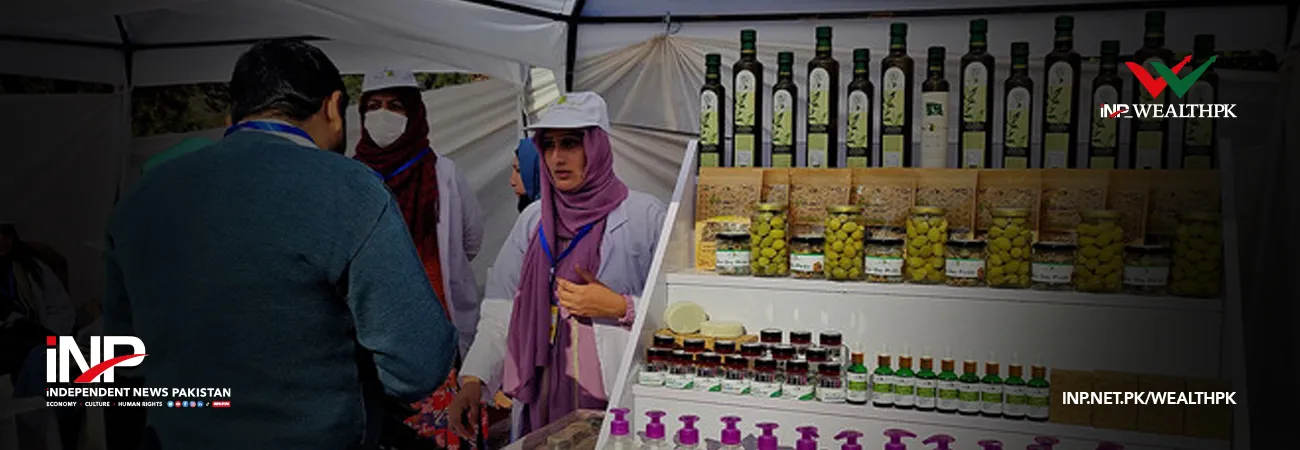INP-WealthPk
Azeem Ahmed Khan
Pakistan is ramping up investment in laboratories, innovation hubs, and skill development to modernize its olive sector, aiming to build a research-driven, export-oriented olive economy that supports rural livelihoods and reduces reliance on imported edible oils, according to documents available with Wealth Pakistan. The government has placed science, technology, and human capital at the core of its National Olive Development Strategy, transforming the sector from a traditional plantation model into a high-value, knowledge-based industry.
Four International Olive Council (IOC)-standard laboratories have been established to ensure Pakistan’s olive oil meets global benchmarks for purity and quality. Additionally, three value-addition labs focus on developing cosmetic and specialty food products derived from olives, while 14 specialized nursery tunnels are producing disease-free saplings to guarantee sustainable plantation growth.
To boost production efficiency, modern techniques such as Groasis Water Boxes and Nursery Plant Starter Grow Trays have achieved up to 90% propagation success, supported by five automated weather stations across different agro-climatic zones for climate and yield monitoring. The government has also published 36 technical manuals and guidelines, including an olive production calendar, to promote best practices among farmers.
Water efficiency remains a key focus, with drip irrigation systems installed on 5,594 acres, significantly cutting wastage in arid zones. Geo-mapping via GIS and Google Earth enables precise monitoring of plantations, irrigation, and productivity indicators, allowing data-based decision-making for sustainability and climate resilience. Post-harvest infrastructure has expanded rapidly. Fifty-one extraction units are now operational nationwide — including large-capacity facilities in Attock, Loralai, and Quetta — while six fruit processing units in Islamabad, Chakwal, Tarnab, and Quetta enhance grading and slicing capabilities.
Quality control is ensured through IOC-standard tests for free fatty acids, peroxide levels, and oxidative stability, the document stated. Human resource development is another pillar of the modernization drive. More than 243 training programs have been conducted, benefiting 16,366 participants, including women and youth, in areas such as orchard management, oil extraction, and branding.
The government has also organized four international conferences, seven national seminars, and six olive festivals to foster awareness, knowledge exchange, and investor engagement. Private sector participation is growing steadily. Over 85 startups and entrepreneurs are now producing extra virgin olive oil and value-added items such as pickles, jams, cosmetics, and nutraceuticals. The “Pak Olive” national brand, registered with the Intellectual Property Organization of Pakistan, is promoting standardized labeling and marketing to strengthen consumer trust and export visibility.
To encourage innovation, the government has launched public-private partnership schemes offering 50:50 cost-sharing grants for extraction units, processing kits, and harvesting equipment. These initiatives are helping rural entrepreneurs and small-scale farmers build capacity, generate employment, and move up the agricultural value chain. International cooperation continues to play a vital role in this transformation. Pakistan currently holds observer status at the International Olive Council (IOC) and is pursuing full membership to enhance its global footprint.
Collaborative projects worth €24.5 million, funded by the Government of Italy, CIHEAM Bari, AICS, and the TEVET Umbrella initiative, are supporting technical training, curriculum development, and institutional capacity building. Despite remarkable progress, challenges persist — including a shortage of certified technicians, limited crop-specific extension services, and constrained access to marketing and advisory support.
The document underlines that sustained public-sector support will be essential to ensure the sector’s long-term sustainability and global competitiveness during its transition phase. With continued investment in research, startups, and human development, Pakistan’s olive sector is on track to emerge as a high-value, innovation-led industry, contributing to rural income generation, import substitution, and export diversification in the years ahead.

Credit: INP-WealthPk









